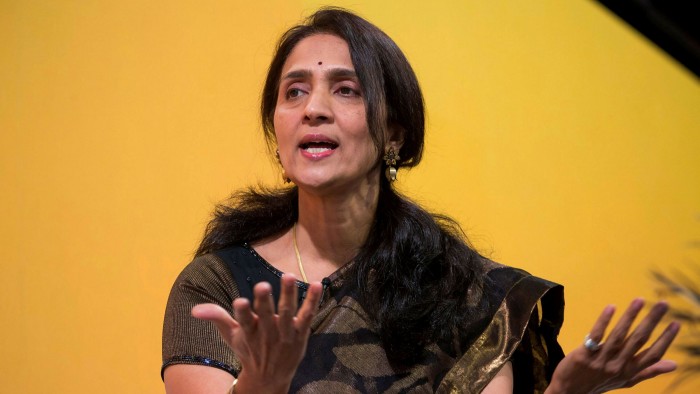India’s NSE yogi scandal puts spotlight on mystic advisers

Roula Khalaf, Editor of the FT, selects her favourite stories in this weekly newsletter.
A recent order by India’s securities watchdog accusing a former stock exchange executive of “bizarre misconduct” for sharing confidential information with an alleged yogi in the Himalayas has pulled the curtain back on the role of mystic advisers in the country.
Chitra Ramkrishna quit the National Stock Exchange of India (NSE) in 2016 when the derivatives exchange was engulfed in an algorithmic trading scandal. The order alleged that she violated securities laws when she consulted on confidential NSE decisions with a person she claimed was her spiritual adviser, who she first met on the banks of the Ganges.
“Senior leaders often seek informal counsel from coaches, mentors or other seniors in this industry,” Ramkrishna told the Securities and Exchange Board of India (Sebi) in April 2018. “I felt his guidance would help me perform.”
In the wake of the revelations, the NSE put out a statement on Thursday saying it was “committed to the highest standards of governance and transparency and will extend full co-operation to the regulator”.
The scandal has put the spotlight on an industry of astrologers, numerologists and yogis who advise executives in India. Their services range from reading horoscopes of potential hires to advising on auspicious timing for a product launch or critical meeting.
“The topmost business families of India do not move without consulting good astrologers,” said Anupam V Kapil, an astrology columnist for the Times of India. He added that he provides advice to business people on topics ranging from brand names to board composition.
But experts have said the NSE case goes far beyond the norm. “An astrologer can guide you,” said Arun Kumar, an honorary professor at New Delhi’s Institute of Social Sciences, “but you don’t give crucial information about your company.”
Hindu astrology is ubiquitous in Indian popular culture, but few openly talked about it in business, said experts. “It is a matter of ridicule if [you] put it out in the open,” said Nupurnima Yadav, an academic and author of Astrology in India: A Sociological Inquiry. “All these matters are usually kept very, very private.”
In India, bespoke services cost upwards of $173, such as for a “corporate astrology” horoscope reading to assess the merits of a new board member or hire. It can cost around $150 for numerology advice on a brand name. Astrologers can charge $1,000 or more for an “astro-architecture” consultation on office buildings to revamp the building’s energy and shake off underperformance.
Astrologers form part of a growing number of executive coaches across the world. The International Coaching Federation estimates that there were 71,000 coach practitioners in the world in 2020, an increase of one-third compared with 2015.
Some of India’s top business families have endorsed astrologers. “I have seen many astrologists in our country and abroad,” Gopichand Hinduja, one of the four billionaire Hinduja brothers, said in a video. “I strongly believe in planets.”
Hinduja consults astrologers, including Sundeep Kochar, who introduces himself as an “astro-consultant” and life coach. Kochar reads horoscopes on a MacBook at his office in Mumbai and charges a flat rate of $250 for a 30-minute consultation. An industrialist once hosted him on a private jet and the consultant has recently bought a $1mn home.
In many ways, the astrologer-client relationship resembles that of a therapist or mentor. “You have to talk heart to heart,” said Kochar, adding that clients usually visit him twice a year. “Their market price might go down if there’s some turbulence going on, so the astrologer should be their confidante.”
Kochar said business people had asked him to read the horoscopes of job candidates. “The moment I see your date of birth, time and place . . . I will understand who you are,” he said. “So your strengths, your weaknesses, your potential . . . everything in 10 seconds.”
Executives at companies ranging from banks to hotels have engaged “astro-architect” Neeta Sinha to reconfigure their offices. Using planetary readings, “I consider the problem of the place and I balance it”, said Sinha, adding that she uses mirrors, plants and colours to achieve harmony.
Other corporates want to ensure they have selected favourable names using numerology, which uses numbers to predict the future. Sanjay B Jumaani, a numerologist, said that for company brands and logos “we equate the vibrations and bring it on an auspicious number, which represents a planet which is materialistic and auspicious”.
In the NSE case, Sebi alleged that Ramkrishna was “merely a puppet” in the unidentified yogi’s hands and has fined her Rs30mn ($402,000). The regulator added that Ramkrishna’s alleged yogi claims were a “bizarre attempt at concealing the identity of the unknown person”.
The scandal is unlikely to damage the divination business and the relationships the astrologers hold with top executives.
Paytm founder Vijay Shekhar Sharma, whose digital payments company launched India’s biggest IPO last year, tweeted his gratitude to famed astrologer Bejan Daruwalla when he died.
“We shared our jokes and fond memories of working together way back in early days,” said Sharma. “He always will have [a] special place in my heart.”
Letter in response to this article:
Comments